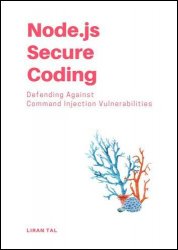Node.js Secure Coding: Defending Against Command Injection Vulnerabilities
- Добавил: literator
- Дата: 15-01-2024, 18:48
- Комментариев: 0
 Название: Node.js Secure Coding: Defending Against Command Injection Vulnerabilities
Название: Node.js Secure Coding: Defending Against Command Injection VulnerabilitiesАвтор: Liran Tal
Издательство: Leanpub
Год: 23.09.2023 (Version v1.2)
Страниц: 113
Язык: английский
Формат: pdf (true), epub
Размер: 20.7 MB
Master Node.js security and secure coding best practices through analyzing and exploiting real-world vulnerable npm packages.
Master Node.js security through hands-on learning and best practices. Learn secure coding conventions in Node.js by executing command injection attacks on real-world npm packages and analyzing vulnerable code. The book features 33 self-assessment yes-no, fill-the-blank, and multiple answer questions to help you evaluate and test your knowledge of Node.js secure coding. You'll analyze the code of 6 vulnerable npm packages found vulnerable via CVE reports to learn best practices on command injection vulnerabilities. With 6 additional references to vulnerable npm packages, you'll strengthen your skills in secure coding.
This book takes an adventure-based approach to application security learning, where you will be playing detective who unravels the mysteries of common security vulnerabilities. Through these exercises you will learn about secure coding practices, and how to avoid security pitfalls that software developers and open-source maintainers get caught with.
Senior software engineers often recite how one of the most critical skills you should have as an engineer is the ability to read code. The more you read, the easier it becomes for you to understand code and the more context you gain. This book focuses exactly on that - reading vulnerable code, so we can learn from it. This activity creates patterns that our brain learns to identify and that later quickly turn into red flags that we detect and apply in our day-to-day programming and code review routines.
Through insecure coding practices found in vulnerable open-source npm packages, this book examines the security aspects affecting jаvascript and Node.js applications. Developers of other languages such as Python will find references to insecure code and best practices relatively easy to transfer to other server-side languages and software ecosystems.
Software developers who build web applications, and specifically those who practice server-side jаvascript development on-top of the Node.js runtime will greatly benefit from the secure coding practices learned in this book. As a software developer, you will engage in step-by-step code review of real-world popular libraries and their vulnerable code, through which you will investigate how security vulnerabilities manifest and understand the core reasons that lead to a security risk. By reviewing code used in real-world software libraries, you will learn to recognize patterns of insecure code. In addition, you will learn secure coding best practices for working with system processes.
By completing this book, you gain:
Security expertise in mitigating command injection vulnerabilities.
Proficiency in performing secure code reviews through first-hand analysis of real-world npm libraries found vulnerable and their approach to fixing security issues.
A security-first mindset to recognize patterns of insecure code.
Expertise in secure coding best practices to avoid command injection security vulnerabilities.
Knowledge of application security jargon and conventions associated with vulnerability management and severity classification.
Скачать Node.js Secure Coding: Defending Against Command Injection Vulnerabilities
Внимание
Уважаемый посетитель, Вы зашли на сайт как незарегистрированный пользователь.
Мы рекомендуем Вам зарегистрироваться либо войти на сайт под своим именем.
Уважаемый посетитель, Вы зашли на сайт как незарегистрированный пользователь.
Мы рекомендуем Вам зарегистрироваться либо войти на сайт под своим именем.
Информация
Посетители, находящиеся в группе Гости, не могут оставлять комментарии к данной публикации.
Посетители, находящиеся в группе Гости, не могут оставлять комментарии к данной публикации.
